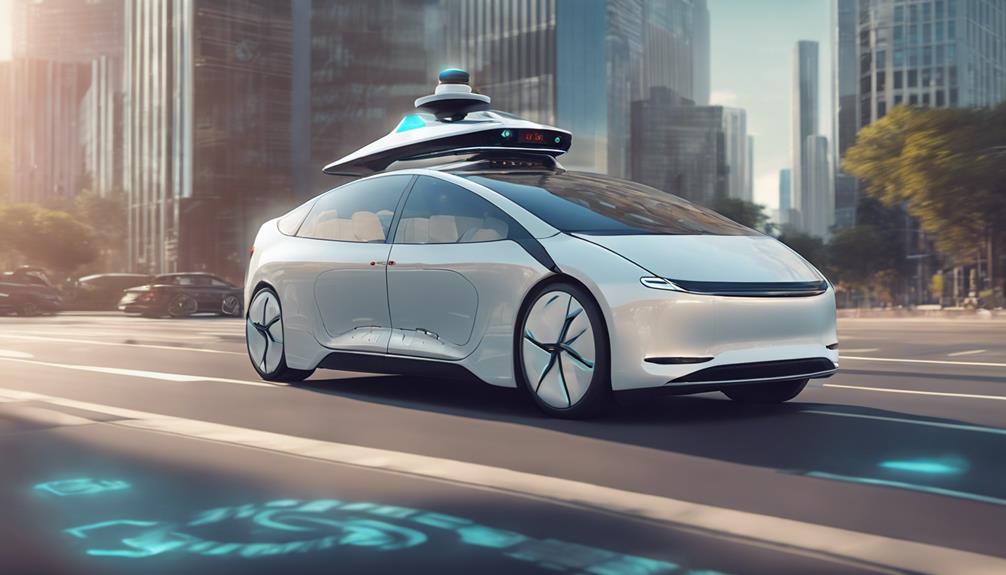In the realm of workforce development, the growing incorporation of artificial intelligence has sparked debates and concerns about its future impact on various professions. With the rapid advancement of technology, the potential for AI to replace roles traditionally held by humans is a significant point of discussion.
The ramifications of this shift extend to sectors such as customer service, transportation, programming, legal support, and manufacturing, each facing unique challenges in adapting to the increasing integration of AI. How will these changes unfold, and what strategies can professionals employ to navigate this transformative landscape?
Key Takeaways
- AI in customer service leads to job displacement by 2025.
- Autonomous vehicles will reshape transportation roles, affecting drivers.
- AI tools automate coding tasks, changing programmer responsibilities.
- Automation in legal services streamlines processes but values human judgment.
Impact on Customer Service Jobs
The impact of AI on customer service jobs is profound and imminent, as automation and chatbots increasingly assume responsibilities traditionally held by human customer service representatives. Data suggests that AI is poised to replace a substantial number of customer service roles globally by 2025, signaling a significant shift in the job market landscape.
As AI tools become more sophisticated, they are reshaping job requirements in the customer service sector, leading to a reduced need for human workers in these roles. The efficiency and cost-effectiveness of automated systems are driving this trend, with AI advancements streamlining customer interactions and redefining the traditional customer service job profile.
The integration of chatbots and other AI technologies is revolutionizing how businesses handle customer inquiries, highlighting the potential for job displacement within the industry. As organizations continue to adopt AI-driven customer service solutions, the role of human workers in this sector is likely to undergo further transformation, emphasizing the need for upskilling and adaptation to emerging job trends.
Automation of Transportation Roles

With the advent of autonomous vehicles, a fundamental transformation in transportation roles is underway, reshaping the industry landscape and the workforce dynamics within it. Autonomous vehicles are expected to replace human drivers, leading to a shift in traditional transportation roles.
While this may result in job displacement for drivers, it also opens up new opportunities in areas such as fleet management and logistics coordination. Individuals can prepare for this shift by enrolling in courses that focus on autonomous vehicle technologies, allowing them to transition into emerging roles within the transportation sector.
Former drivers can explore career paths in maintaining and servicing robotics used in transportation industries, leveraging their existing skills in new ways. The integration of AI in transportation is creating a demand for professionals skilled in developing and implementing autonomous vehicle technologies, signaling a significant evolution in the industry.
Substitution in Programming Positions
Revolutionizing the landscape of programming roles, the integration of AI tools like ChatGPT is rapidly automating coding tasks, fundamentally altering the traditional responsibilities of computer programmers. This automation brought by AI is not just a futuristic concept but a current reality that is reshaping the way programming positions operate.
By accelerating coding processes, AI is streamlining tasks that were once time-consuming for programmers. However, this shift raises important questions about the balance between speed and quality in coding tasks. While AI can speed up coding processes, concerns linger about whether this acceleration might compromise the quality of the code produced.
As AI continues to advance and become more prevalent in programming positions, finding this balance will be crucial. The substitution of certain coding tasks through AI tools like ChatGPT is indicative of a larger trend where technology is altering the landscape of programming roles.
AI's Influence on Legal Support

The increasing integration of AI technologies in the legal field is reshaping the nature of tasks traditionally handled by legal support roles, such as paralegals, by automating processes like document review and contract analysis. AI, including advanced tools like GPT-4, has demonstrated proficiency in legal examinations, indicating its potential to revolutionize legal support functions. By streamlining legal research and analysis, AI enhances efficiency and accuracy, posing a significant impact on the roles of paralegals and other legal support professionals.
The automation of document review and contract analysis through AI technologies signifies a shift towards more streamlined and precise outcomes in the legal field. While AI can efficiently handle repetitive and data-intensive tasks, roles demanding human judgment and strategic thinking remain crucial. Legal professionals can adapt to this AI-driven transformation by specializing in areas where human expertise is irreplaceable, ensuring continued relevance in the evolving landscape of legal support. Embracing AI as a complement to legal workflows can lead to enhanced productivity and improved decision-making processes within the legal sector.
Transformation of Manufacturing Jobs
The ongoing integration of automation and AI technologies in manufacturing is fundamentally reshaping the landscape of traditional industrial roles. Automation, driven by robotics and AI advancements, is predicted to replace approximately 20 million manufacturing jobs by 2030. Tasks that were once carried out by human workers, such as assembly line operations and machine handling, are now being automated to enhance precision, efficiency, and overall productivity in manufacturing processes.
This transformation necessitates a workforce that is adept at working alongside AI technologies, emphasizing the importance of upskilling in areas like technology and robotics to maintain job market competitiveness. As AI continues to revolutionize the manufacturing sector, workers must undergo a significant transformation to adapt to the evolving job requirements. Embracing these technology advancements is crucial for the future sustainability of manufacturing jobs and ensuring that the workforce remains relevant in an increasingly automated industry.
Frequently Asked Questions
What Are the Jobs AI Will Replace?
Artificial Intelligence is poised to replace jobs across various sectors, including customer service representatives, drivers, programmers, research analysts, and paralegals. Automation and AI technologies are streamlining tasks traditionally carried out by humans, leading to potential job displacement.
How Will AI Replace Human Work?
In the imminent interplay between artificial intelligence and human labor, the gradual displacement is a mathematical certainty. AI's superior efficiency in various tasks, coupled with advancing technology, will reshape industries, necessitating substantial reskilling and adaptation.
What Jobs Will Be Gone by 2030?
Jobs such as customer service representatives, drivers, programmers, research analysts, and paralegals are at risk of being replaced by AI by 2030. Automation is projected to impact 85 million jobs globally by 2025, affecting multiple industries.
What Jobs Will Be Created by Ai?
Artificial Intelligence is expected to create new job roles such as machine learning engineers, AI ethicists, and data scientists. These positions require specialized skills in programming, analysis, and ethical decision-making, contributing to the evolving job landscape.
Conclusion
In conclusion, as artificial intelligence continues to advance, it is evident that certain job roles will be replaced by automation. The transformative impact of AI across various industries, from customer service to transportation and programming, highlights the need for adaptation and upskilling in the workforce.
As the adage goes, 'Adapt or perish, now as ever, is nature's inexorable imperative.' It is crucial for individuals and organizations to embrace the benefits and challenges of AI integration to thrive in the evolving job market.









